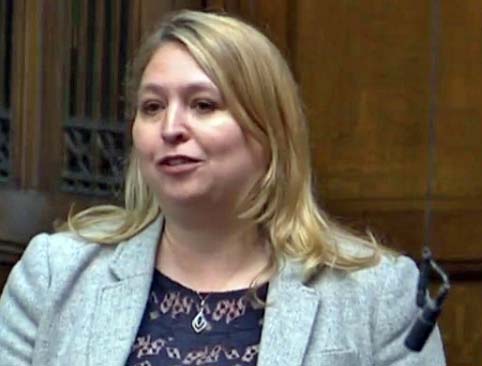Biddulph MP Dame Karen Bradley has said she is “delighted” to have been elected as chair of the Home Affairs Select Committee, a cross-party committee of MPs responsible for scrutinising the work of the Home Office and its associated bodies.
The committee chooses its own subjects of inquiry and has invited written evidence from interested parties. It holds public evidence sessions, usually in committee rooms at the House of Commons, although it does have the power to meet away from Westminster.
Elections for the positions of chairs of Select Committees took place in Parliament last week.
Accepting the position, Dame Karen told MPs: “The new Parliament means change all round. Conservatives have exchanged government for opposition and the duty of his majesty’s loyal opposition is to oppose.
“We can oppose with better ideas, better policies, better arguments.
“Opposition doesn’t just mean disagreeing for its own sake. It means practical, honest scrutiny of Government proposals. Parliamentary committees are a vital part of that democratic scrutiny.
I’ve been an MP for 14 years and during that time I’ve been a whip, a minister in the Home Office and a Cabinet minister at (the department for media) and the Northern Ireland Office, and I’ve also been the Procedure Committee chair.
“Most importantly I’ve been the representative of Staffordshire Moorlands. That means I’ve seen all aspects of Parliament.
“As minister for preventing abuse, exploitation and crime at the Home Office, I brought in the Serious Crime Act and then the Modern Slavery Act.”
She went on: “Over this summer we’ve seen shocking threats to law and order and the committee’s scrutiny of ministers’ response to the chaos is an important part of giving the public confidence in our system.
“The Modern Slavery Act is particularly close to my heart. It provides the tools to protect people in the UK from this evil exploitation. We’ve set a lead in this field as a country and (I will) aim to help make sure ministers maintain those standards.
“Modern slavery is not a crime happening somewhere obscure overseas but right here in the UK. It’s impossible to estimate the number of victims of modern slavery in our country reliably, but it’s clear that there are at least 10,000. In 2023, the national referral mechanism for modern slavery received 17,004 referrals, the highest ever. That’s both heartbreaking and unacceptable.
“How can the Home Office better address modern slavery? One problem is that the department does not distinguish between human smuggling, where people are illegally transported with their consent, and human trafficking, in which the individuals illegally transported are victims of coercion and exploitation.
“I’m concerned that this vital distinction is being systematically missed by Home Office policymakers. The result is confused policymaking. As chair, I (will) make addressing this problem a priority.
“Alongside these reforms, the Serious Crime Act better protected British girls from criminalised coercive and coercive controlling behaviour within families for the first time. That goes hand in hand with the preventing violence against women and girls strategy that our Conservative government introduced in 2016. This emphasised early intervention to prevent abuse and sought to ensure the prevention of violence against women and girls was a priority for every government department and agency.
“From addressing rising crime and cracking down on people smuggling, the Home Office is responsible for many of the British people’s key priorities. But the reality is that the institution often struggles to turn policy into reality and Home Office bureaucracy is highly complex. Effective Parliamentary scrutiny helps the department to work better.
“But Home Office efforts are hampered by two key problems- the Home Office is both a policy department and an operational department. It sets policy on immigration but also physically controls the border. This prevents it from developing the necessary institutional expertise in either.
“And the complex division of responsibilities between the Home Office, the ministry of justice, the Attorney General’s Office, the Crown Prosecution Service, and the UK’s police forces make it hard to pursue a unified strategy when tackling a complex problem like violence against women and girls.
“All of these organisations need to be on more or less the same page. As chair, I would aim to help the Home Office to work more effectively and challenge ministers to make sure these organisations are aligned.”
She said the select committee system embodied “much of what’s best in our Parliamentary democracy”.
“Change in Whitehall can often be frustratingly slow but I know from experience that both the process of committee scrutiny and committees’ considered conclusions help to improve Government,” she added.
Recent committee inquiries have included Brexit-related preparations, which found that “insufficient resources had been allocated and insufficient staff planned” to cope with the changes after leaving the EU; counter-terrorism, which found that social media giants such as Facebook, Twitter and YouTube were “consciously failing” to combat the use of their sites to promote terrorism and killings, and had become “the vehicle of choice in spreading propaganda and the recruiting platforms for terrorism”; and domestic abuse, which recommended national refuge funding, a new stalkers register and an end to single universal credit payments.
Sign in
Welcome! Log into your account
Forgot your password? Get help
Password recovery
Recover your password
A password will be e-mailed to you.





